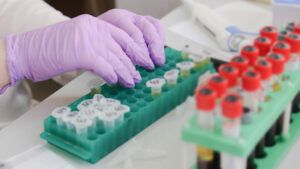$300.00

How
Type of samples to be collected:
Blood (venipuncture—a needle is used to draw blood from a vein)
The PSA test measures the level of prostate-specific antigen, or PSA, in your blood which may be elevated due to prostate cancer. However, high levels of PSA do not always indicate the presence of prostate cancer. Other prostate conditions such as enlarged prostate (benign prostatic hyperplasia) or inflammation of the prostate (prostatitis) can also increase PSA levels. PSA levels also increase with age. If PSA levels are elevated, it’s important to discuss your results with a healthcare provider.
What’s Tested
The prostate is a part of the male reproductive system and urinary systems. The prostate’s main role is to produce seminal fluid that helps carry semen during ejaculation. PSA is a protein produced in the prostate by both cancerous and noncancerous cells. The PSA test measures the levels of PSA in the blood and is often used to screen for prostate cancer in men without symptoms.
Signs & Symptoms
All men are at risk for developing a prostate problem. Symptoms of prostate problems include:
Frequent urge to urinate
Dribbling of urine
Getting up many times during the night to urinate
Blood in urine or semen
Pain or burning during urination
Painful ejaculation
Frequent pain in the lower back, pelvic, or rectal area
Pain caused by touching the prostate
Change in size, firmness, or texture of the prostate
Lumps or hard areas spreading beyond the prostate
If you have any of these symptoms, you may want to consider consulting a healthcare provider.
Preparing for your test
You do not have to fast for this test. You should not ejaculate or exercise vigorously for 48 hours before sample collection since this might affect your test results.
